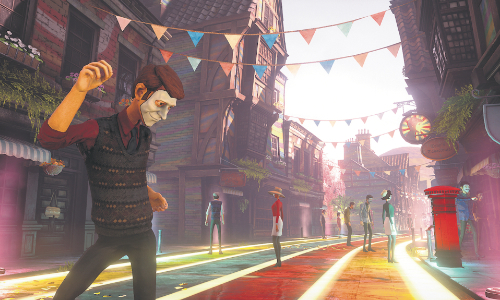Review: We Happy Few

Two years in early access saw We Happy Few transform from a procedurally generated survival sim to a Bioshock-esque narrative drama, with appropriately schizophrenic results.
It presents an interesting spin on the ‘What if the Nazis won the war?’ trope, with the beleaguered residents of fictional British archipelago Wellington Wells placated with a drug called Joy that makes them forget the horrors of the occupation.
When high on Joy, the world takes on the psychedelic rainbow hue of an acid trip. Without it, you can see the ruin and squalor lurking beneath, glimpsing a nation in an acute state of post traumatic stress, desperate to forget some terrible secret about what happened to all the children.
We Happy Few’s influences – often worn ostentatiously upon its sleeve – include Austin Powers, 1984 and Bioshock, with lots 60s psychedelia and ‘totally groovy’ characters; a cruel, secretive government; and a general ambiance of faded grandeur and existential dread. At its best, it asks interesting questions about topics ranging from the aftermath of war to accidental pregnancy and mass medication. Unfortunately, on a very basic level, it’s borderline unplayable.
The story is hampered to the point of bitter frustration by the survival mechanics, which feel like the legacy of a completely different game. You’re required to balance a series of meters, which frequently brings progress to a grinding halt. You might be searching for your long-lost brother, but first you’d better cower in a sewer, deliberately overdose on Joy, wait for the effects of withdrawal to wear off, and then top up again, because if you don’t you risk sobering up in public, causing everyone in sight to attack en mass until you find a dustbin to hide in for what feels like an eternity.
Fighting back is rarely an option as combat is sluggish and unpredictable, while the stealth mechanics haven’t built much on the template laid-down by early 2000s Splinter Cell. It’s also the buggiest ‘finished’ game I’ve ever played; I had entire quest lines blocked when characters refused to spawn, NPCs frequently clipping through the ground, and an ongoing issue that would cause my console to hard-reset.
Having three playable characters in three separate acts introduces even more pacing issues; having levelled up Arthur to the point where circumnavigating Wellington Wells isn’t quite so much of a chore, it’s infuriating to have to through the same tedious motions all over again. And then again. Eventually – and this just feels like trolling on the part of the developers – you have to deal with diabetes on top of all your other survival meters.
This is all bad enough, but We Happy Few’s biggest sin is squandering its potential. After building a genuinely fascinating world, it then requires you to repeat essentially the same fetch quest over and over again until you wish you could just overdose on Joy yourself. For a game that explores the importance of agency, you have none. There are only two ‘choices’ in the game and they’re both just throwaway jokes. How you act has no impact on the world – in one quest you can complete a series of menial tasks or murder a bunch of old ladies; your choice has no consequences.
It’s not like the studio has a lack of content with which to explore branching narratives – there’s at least 40 hours of game here if you tot up all the optional busywork, including hours of cut-scenes. Condensing it into a 10-15 hour experience might have been transformative.
Weirdly, once you’ve solved the game’s mysteries, there’s little replay value – there’s no survival mode, for instance, which seems absurd given the game’s origins. This makes the procedurally-generated elements of the game (the islands will reform in different configurations each time you play the game) totally superfluous, suggesting it was only included in the final product because someone spent a lot of time and effort programming it.
An engaging premise and lovingly crafted post-war dystopia make We Happy Few an interesting curio, but one that will be most keenly remembered as a cautionary tale about the perils of poor game design. The intro screen thanks the game’s 7,344 Kickstarter backers; they deserved better.
First published in City A.M.

